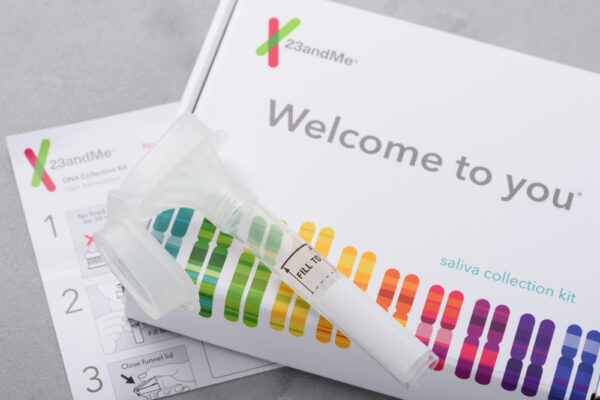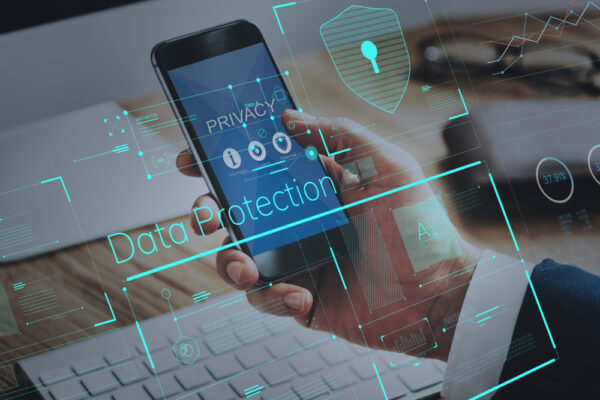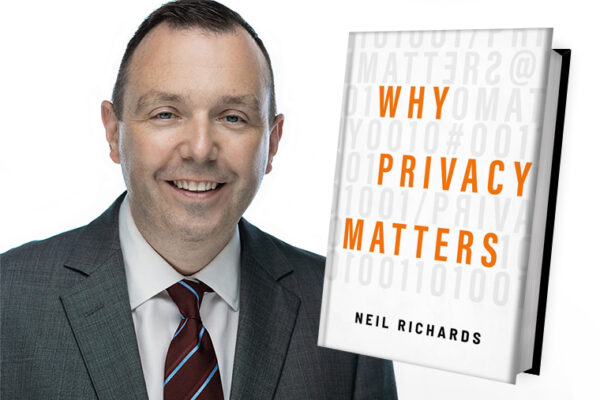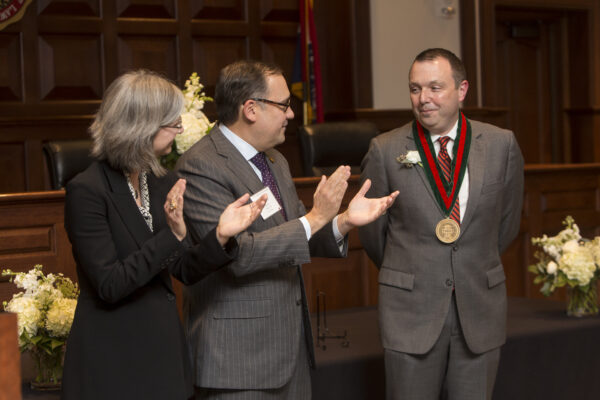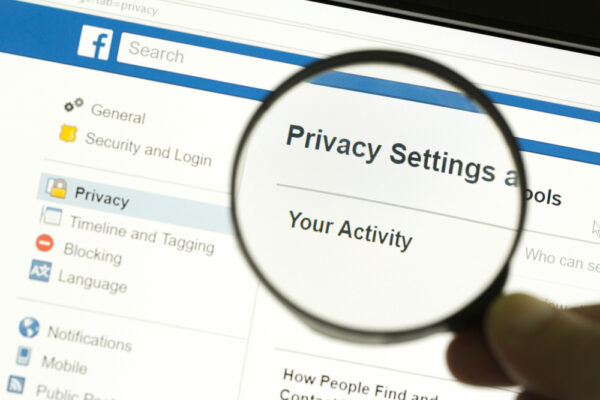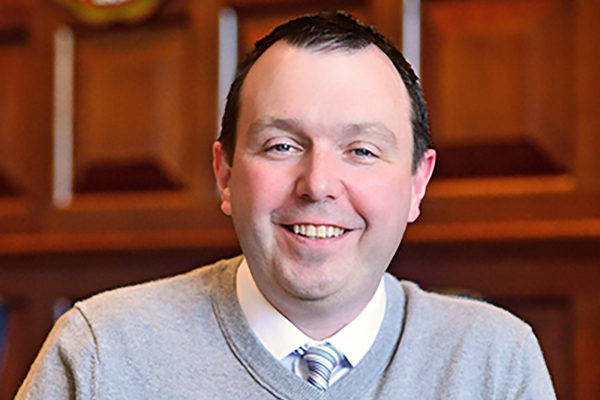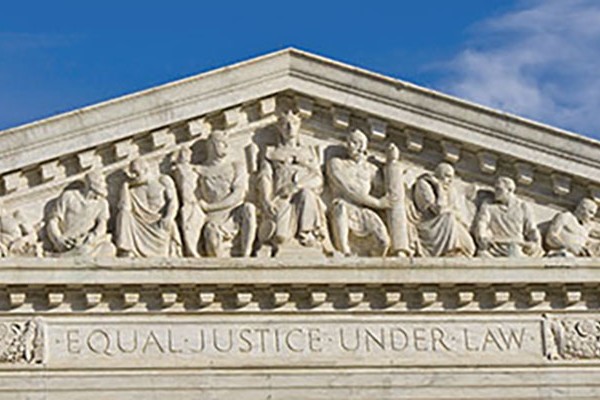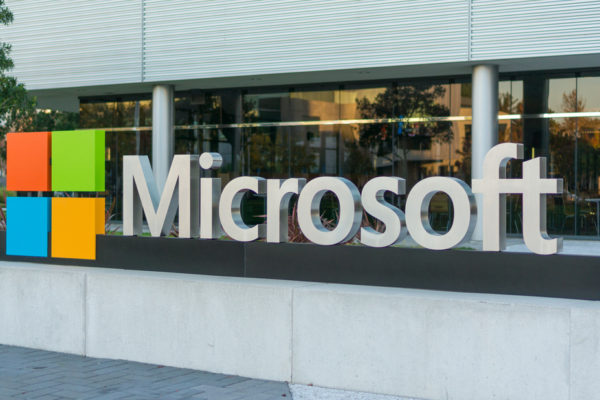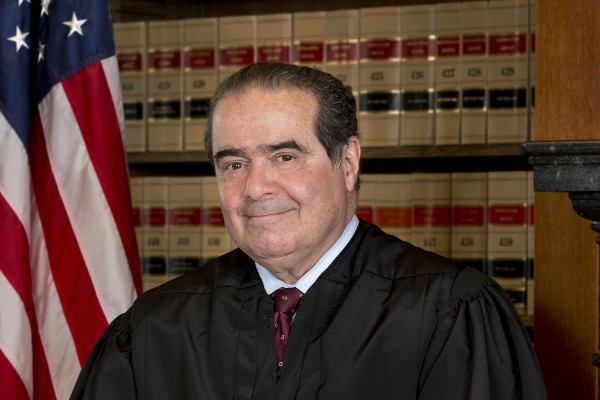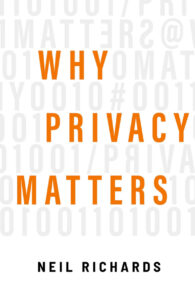Neil Richards is one of the world’s leading experts in privacy law, information law and freedom of expression. He writes, teaches and lectures about the regulation of the technologies powered by human information that are revolutionizing our society. Richards co-directs the Cordell Institute for Policy in Medicine & Law. He is also an affiliate scholar with the Stanford Center for Internet and Society and the Yale Information Society Project, a fellow at the Center for Democracy and Technology and a consultant and expert in privacy cases. Richards serves on the board of the Future of Privacy Forum and is a member of the American Law Institute.

Neil Richards
Koch Distinguished Professor in Law
Contact Information
- Phone: 314-935-4794
- Email: nrichards@wulaw.wustl.edu
- Website: Website
Media Contact
In the media
23andMe is out of bankruptcy. You should still delete your DNA.
Neil M. Richards, the Koch Distinguished Professor in Law
Meta CEO Mark Zuckerberg expected to testify in $8 billion Facebook privacy lawsuit
Neil Richards, the Koch Distinguished Professor in Law
The New Jersey drone scare is a privacy wake-up call
Hopefully this drone mystery will drive lawmakers to regulate these technologies more thoughtfully, in ways that allow us to enjoy their benefits while also not sending entire states into a full-blown panic, writes Neil Richards.
Surveillance in Spotlight Amid Ongoing EU-U.S. Data Privacy Rift
Neil Richards, the Thomas and Carol Greene Professor of Law
South Korea’s COVID Success Stems From an Earlier Infectious Disease Failure
While the previous administration never had a coordinated plan to control the virus, there is still a chance—and urgent need—to do better. South Korea’s model offers both a blueprint of success, write Neil Richards and Jiyeon Kim.
Free Speech In 2021 Requires Oversight, But From Whom?
Neil Richards, the Thomas and Carol Greene Professor of Law
Trump’s Antifa Obsession Is an Unconstitutional Distraction
Neil Richards, Koch Distinguished Professor in Law
A Look At How The Supreme Court Chief Justice May Preside Over Senate Impeachment
Neil Richards, the Thomas and Carol Greene Professor of Law
Emerging from the shadows: the U.S. chief justice who will preside over Trump’s trial
Neil Richards, the Thomas and Carol Greene Professor of Law
There’s a lot to like about the Senate privacy bill, if it’s not watered down
We can do better on privacy than a GDPR-lite, or the inadequate Wicker bill, and the Cantwell bill is a good, if imperfect, place to begin, writes Neil Richards.
Chief Justice John Roberts, who’s clashed with Trump, would oversee impeachment trial
Neil Richards, the Thomas and Carol Greene Professor of Law
It’s time to try something different on Internet privacy
Neil Richards, the Thomas and Carol Greene Professor of Law
The blueprint for a 3-D-printed gun was uploaded in book form to Amazon as a free speech exercise. Amazon removed it.
Neil Richards, the Thomas and Carol Greene Professor of Law
Trump Can’t Block Critics on Twitter. What This Means For You
Neil Richards, the Thomas and Carol Greene Professor of Law
Maryland governor settles lawsuit with ACLU over Facebook censorship
Neil Richards, the Thomas and Carol Greene Professor of Law
Chuck Johnson’s Twitter Free Speech Suit Is Probably DOA
Neil Richards, the Thomas and Carol Greene Professor of Law
New Low-Cost Spy Satellites Are Getting Scarily Powerful
Neil Richards, the Thomas and Carol Greene Professor of Law
Should Facebook Ads Be Regulated Like TV Commercials?
Neil Richards, the Thomas and Carol Greene Professor of Law
‘Textalyzer’ May Bust Distracted Drivers — But at What Cost to Privacy?
Neil Richards, the Thomas and Carol Greene Professor of Law
President’s Twitter Account Should Not Block Users, First Amendment Lawyers Argue
Neil Richards, the Thomas and Carol Greene Professor of Law
A Campus Murder Tests Facebook Clicks as Evidence of Hate
Neil Richards, the Thomas and Carol Greene Professor of Law
Blocked Immigration Ban Proves Trump’s Tweets Will Haunt His Presidency
Neil Richards, the Thomas and Carol Greene Professor of Law
With the latest WikiLeaks revelations about the CIA – is privacy really dead?
Neil Richards, the Thomas and Carol Greene Professor of Law
Tech Giants Have the Legal Clout to Help Stop Trump’s Refugee Ban
Neil Richards, the Thomas and Carol Greene Professor of Law
Trump’s SCOTUS Pick Needs to Get Tech — These Cases Show Why
Neil Richards, the Thomas and Carol Greene Professor of Law
Donald Trump’s surveillance state: All the tools to suppress dissent and kill free speech are already in place
Neil Richards, the Thomas and Carol Greene Professor of Law
Microsoft suit is latest tech clash with US over privacy
Neil Richards, professor of law
Microsoft Sues Justice Department Over Secret Customer Data Searches
Neil Richards, professor of law
Apple-FBI dispute echoes Microsoft anti-trust case on key point
Neil Richards, professor of law
The Apple Case Will Grope Its Way Into Your Future
Neil Richards, professor of law
Global profits at stake as Apple, tech fight U.S. on security
Neil Richards, professor of law
Terrorist’s locked phone adds urgency to encryption debate in Congress
Neil Richards, professor of law
Stories
Richards serves as privacy ombudsman in 23andMe bankruptcy case
WashU privacy law expert Neil Richards had a unique opportunity this year to put his training to use: He was named an ombudsman to guide the courts on how genetic data owned by 23andMe should be handled during its sale.
Cordell Institute appoints new faculty co-director
The university’s Cordell Institute for Policy in Medicine & Law announced the appointment of a new faculty co-director from the Washington University School of Medicine in St. Louis, Richard Cote, MD, the Edward Mallinckrodt Professor of Pathology.
New rules needed to govern consumer privacy
A proposed federal commercial surveillance rule would be an important and overdue change in U.S. consumer protection, said Neil Richards, a privacy law expert at the Washington University School of Law.
Is privacy dead?
In a new book, “Why Privacy Matters,” one of the world’s leading experts in privacy law, Neil Richards, the Koch Distinguished Professor in Law and co-director of the Cordell Institute for Policy in Medicine & Law, argues privacy is not dead, but up for grabs.
Richards pushes for privacy reform during Senate committee hearing appearance
Neil Richards, the Koch Distinguished Professor in the School of Law at Washington University in St. Louis, addressed a Dec. 9 hearing of the Senate Committee on Commerce, Science, and Transportation, where he pushed for passage of a comprehensive law that would provide appropriate safeguards, enforceable rights and effective legal remedies for consumers when it comes to data sharing.
Getting the First Amendment wrong
If Clearview AI were to get its way, the only winner would be Clearview AI. And our privacy, our free speech, and American industry as a whole will be the losers.
Richards installed as inaugural Koch Distinguished Professor of Law
Neil M. Richards has been installed as the inaugural Koch Distinguished Professor of Law at Washington University in St. Louis. A ceremony and reception were held last October to mark the occasion.
There’s a lot to like about the Senate privacy bill, if it’s not watered down
We can do better on privacy than a GDPR-lite, or the inadequate Wicker bill, and the Cantwell bill is a good, if imperfect, place to begin.
The time for privacy reform is now
America needs an internet privacy bill but Congressional inaction could force states into adopting an Americanized version of Europe’s General Data Protection Regulation. That’s a move that would be insufficient and ineffective, argues a leading privacy law expert at Washington University in St. Louis.
It’s time to try something different on Internet privacy
It’s time to take a bold step forward. The United States has an opportunity to redefine itself as the country that protects the trust that people give to companies. By embracing trust, the United States can become a leader on privacy instead of following the path of false promises and diminishing returns.
Cordell Institute signs ‘Paris Call for Trust and Security in Cyberspace’
Washington University’s newly launched Cordell Institute for Policy in Medicine & Law has signed on as one of the early signatories of French President Emanuel Macron’s “Paris Call for Trust and Security in Cyberspace,” announced Nov. 12 as part of the peace forum commemorating 100 years since the ending of World War I.
WashU Expert: Clear principles needed for meaningful digital free expression
Our daily lives revolve around the internet, whether it’s personal contact, news or the sharing of political views. As such, there remains significant work to do so the internet can deal with the real challenges it faces, rather than ones it fails to consider, an internet privacy expert at Washington University in St. Louis said.
Why the Logan Pauls of the world can push the boundaries of privacy and good taste
Social media is having its difficult adolescence. Facebook is approaching its 14th birthday, YouTube is 13, and Twitter is almost 12. In each case, a happy childhood has been replaced by awkward teen or tween years. In recent weeks, each of these companies has suffered embarrassing setbacks.
WashU Expert: Proposed ‘revenge porn’ bill balances regulation with protecting free expression
U.S. Congresswoman Jackie Speier introduced on July 14 a long-delayed federal bill that would outlaw nonconsensual pornography in the United States. While he supports the law, Neil Richards, privacy law expert at Washington University in St. Louis, think it’s important that the bill be drafted in such a way as to not be a tool for censorship that can threaten our commitment to free expression.
WashU Expert: Spokeo decision has potential to expand privacy laws
A recent Supreme Court case that was expected to limit privacy laws actually has the potential to expand them, according to an expert on privacy law at Washington University in St. Louis.
WashU Expert: Microsoft suit a win for civil liberties
Microsoft’s challenge to the gag order provisions of the federal Stored Communications Act should be applauded by everyone who cares about civil liberties, whether in the physical or digital worlds, said Neil Richards, a privacy law expert at Washington University in St. Louis.
WashU Expert: Apple and the expectation of privacy
Apple is fiercely opposing a court order to unlock an iPhone used by San Bernardino shooter Syed Farook. The company is taking an important stand on behalf of its users’ privacy, and should be applauded, said Neil Richards, professor of law and privacy law expert.
Law school panel to discuss Scalia legacy
Three experts on the Supreme Court from the School of Law will discuss the recent death of Antonin Scalia, his legacy and how his vacancy will be filled. The talk, “Justice Antonin Scalia: The Legacy and the Vacancy,” will be held from 12:05-1 p.m. Wednesday, Feb. 17. It is free and open to the public.
WashU Experts: Supreme Court same-sex marriage decision justified
A decision by the U.S. Supreme Court that the Constitution guarantees a right to same-sex marriage is justified, say two constitutional law experts at Washington University in St. Louis.
WashU Expert: Americans ‘care deeply about their privacy’
Several key provisions of the Patriot Act ended this week, after the Senate let them expire. As a result, the National Security Agency has, at least temporarily, halted the bulk data collection program used to amass phone data for millions of Americans. Neil Richards, JD, professor of law at Washington University in St. Louis and one of the country’s foremost academic experts on privacy law, said the fact that expiration of these powers hasn’t provoked mass outrage shows Americans deeply value privacy.
Hague releases declaration on intellectual privacy based on work of law’s Richards
More than 50 international organizations and global experts signed The Hague Declaration on Knowledge Discovery in the Digital Age May 6. The declaration calls for immediate changes to intellectual property (IP) law and the removal of other barriers preventing larger and more equal access to data. The document is based in part on the work of Neil Richards, JD, professor of law. Richards is a noted expert on data ethics and intellectual freedom and has published widely on issues related to privacy in the digital age.
Intellectual privacy vital to life in the digital age
In our increasingly digital world, the balance between privacy and free speech is tenuous, at best. But we often overlook the important ways in which privacy is
necessary to protect our cherished civil liberties of freedom of speech,
thought and belief, says Neil M. Richards, JD, a privacy law expert at Washington University in St. Louis and author of the new book, “Intellectual Privacy: Rethinking Civil Liberties in the Digital Age,” published Feb. 2 by Oxford University Press.
Wash U Expert: Police body cameras can be effective if used properly
As part of the White House response to unrest in
Ferguson, President Barack Obama has proposed $263 million for police
body camers and training. While body cameras can be effective,
they only work if the police don’t turn them off or delete their
records, says a privacy expert at Washington University in St. Louis.
The right to privacy in a big data world
In the digital age in which we live, monitoring,
security breaches and hacks of sensitive data are all too common. It has
been argued that privacy has no place in this big data environment and
anything we put online can and probably will be seen by prying eyes. In
a new paper, noted Washington University in St. Louis privacy law expert Neil M. Richards, JD, makes the
case that when properly understood, privacy rules will be an essential
and valuable part of our digital future.
Four myths about privacy
Many privacy discussions follow a similar pattern, and involve the same kinds of arguments. It’s commonplace to hear that privacy is dead, people — especially kids — don’t care about privacy, people with nothing to hide have nothing to fear, and privacy is bad for business. “These claims are common, but they’re myths,” says Neil M. Richards, JD, privacy law expert and professor of law at Washington University in St. Louis.
WUSTL privacy law expert says Obama’s surveillance reforms a good but incomplete start
3.5 out of 12 — That is the score the Electronic Frontier Foundation gave President Obama’s highly anticipated address on NSA spying last week. And while lauding Obama for recognizing the dangers of government surveillance and the importance of discussing it, Washington University in St. Louis privacy law expert Neil Richards agrees that the president did not quite go far enough to protect individual privacy.
Email privacy a hallmark of a free society
As encrypted email services like Lavabit shut their
doors, the importance of email privacy becomes even more clear writes
Neil Richards, JD, privacy law expert and professor of law at Washington
University in St. Louis, in a recent CNN opinion piece.
Increasing surveillance a dangerous reaction to Boston bombings, says privacy law expert
In the aftermath of the Boston Marathon bombings,
some people are calling for an increase in surveillance cameras
throughout U.S. cities. “This would be a mistake,” says Neil
Richards, JD, privacy law expert and professor of law at Washington
University in St. Louis. “It would be dangerous to our civil liberties,
and it would be bad policy.” Richards
gives his personal reaction to the Boston bombings and offers three
reasons why increasing the number of surveillance cameras would be an
unnecessary response to recent events in a CNN opinion piece, “Surveillance State No Answer to Terror.”
The dangers of surveillance – it’s bad, but why?
Surveillance is everywhere, from street corner cameras to the subject of books
and movies. “We talk a lot about why surveillance is bad, but we don’t
really know why,” says Neil Richards, JD, privacy law expert and
professor of law at Washington University in St. Louis. “We only have a
vague intuition about it, which is why courts don’t protect it. We know
we don’t like it, and that it has something to do with privacy, but
beyond that, the details can be fuzzy.” Richards’ new article on the topic, “The Danger of Surveillance,” will be published in the next issue of the Harvard Law Review.
Three challenges for the First Amendment
A group of some of the country’s top scholars in First
Amendment law recently gathered at Washington University in St. Louis to discuss pressing challenges
being faced by the first of our Bill of Rights. Three issues rose to the
top of the list for Washington University’s first amendment experts:
free expression in a digital age; impaired political debate; and
weakened rights of groups.
Law struggling to catch up with use of drone technology, says privacy expert
Charlottesville, Va. recently became the first town
in the U.S. to pass an anti-drone resolution, calling for a restriction
on the use of the unmanned surveillance vehicles. “For drones, I
think the problem is that they do have some legitimate law enforcement
purposes, but they raise massive problems of invasion of privacy and
government surveillance that we need to think through before we deploy
drones in vast numbers in our skies,” says Neil Richards, professor of
law at Washington University in St. Louis.
Privacy law expert comments on Bork’s legacy
Robert Bork was a major figure in the history of
American law, and of the Supreme Court, says Neil Richards, JD,
professor of law at Washington University in St. Louis and former law
clerk for Supreme Court Chief Justice William H. Rehnquist. “There is a great irony to Bork’s death this week, a
day after the House of Representatives voted to relax the privacy
protections in the so-called “Bork Bill,” the federal law that protects
the privacy of our video records.”
Social media auto-overshare to meet its demise in 2013, says privacy law expert
Everyone knows someone who overshares on social media,
from constant updates about daily minutiae to an automatically generated
stream of songs listened to, articles read, games played and other matters blast-broadcast through various applications. Intentional
over-sharers may be a necessary nuisance in our wired world, but the
days of the auto-generated social media stream may be numbered, says
Neil Richards, JD, privacy law expert and professor of law at Washington
University in St. Louis.
Legal fight over royal vacation photos highlights difference between European and American views of privacy and free speech
Britain’s royal family has obtained an injunction against the French magazine Closer to prevent it from publishing topless photographs of the Duchess of
Cambridge, Kate Middleton. “The case would likely come out differently if
it were brought in the United States,” says Neil Richards, JD,
professor of law at Washington University in St. Louis. Richards, an internationally recognized expert in privacy and free speech law who hails from England, explains that English and European courts have been very aggressive in stopping media
from publishing pictures delving into the sex lives of celebrities.
WUSTL School of Law, Cambridge organize first International Privacy Law Conference June 26 and 27
Leading privacy law experts from around the world will gather in Cambridge, England, on June 26 and 27 for the first International Privacy Law conference, a joint effort between Washington University in St. Louis School of law and the University of Cambridge. “Every modern society is confronting novel issues of privacy, and our conference brings together some of the smartest thinkers about privacy in the world to compare notes and come up with new solutions,” says Neil M. Richards, JD, conference co-chair and professor of law at Washington University. Conference topics will include intellectual privacy, the conflict between privacy and free speech, the psychology of privacy, public access to court records, and privacy reform in Australia.
Privacy law expert warns of the perils of social reading
The Internet and social media have opened up new vistas for people to share preferences in films, books and music. Services such as Spotify and the Washington Post Social Reader already integrate reading and listening into social networks, providing what Facebook CEO Mark Zuckerberg calls “frictionless sharing.” “But there’s a problem. A world of automatic, always-on disclosure should give us pause,” says Neil M. Richards, JD, privacy law expert and professor of law at Washington University in St. Louis.
Twitter subpoenas a challenge to intellectual privacy
The City of New York recently subpoenaed a Twitter account as part of an ongoing Occupy Wall Street criminal case. The Occupy protester named in the case is challenging the subpoena. Privacy law expert Neil Richards, JD, professor of law at Washington University in St. Louis, says that it’s not surprising that law enforcement groups are interested in accessing the volume of records relating to our speech that social media platforms generate. “By and large, this data should remain private, and online companies should keep the data confidential and not share it any more broadly than we as users and speakers want it to be shared,” Richards says.
SOPA, PROTECT IP will stifle creativity and diminish free speech, say WUSTL experts
Wikipedia and other sites plan to go dark to protest the Stop Online Piracy Act (SOPA) and the PROTECT IP Act under consideration in Congress. Three law professors from Washington University in St. Louis, Kevin Collins, Gregory Magarian and Neil Richards, signed a letter to Congress in opposition to the PROTECT IP Act. Read Magarian and Richards’ current comments on SOPA and PROTECT IP.
Privacy legal fights should focus on intrusion, not hurt feelings (VIDEO)
Privacy lawsuits in the United States usually seek damages for revealing embarrassing but true facts by the media— the so-called “disclosure tort” — but this is a “poor vehicle for grappling with the problems of privacy and reputation in the digital age,” says Neil M. Richards, JD, privacy law expert and professor at Washington University in St. Louis School of Law. “The disclosure tort has never really worked successfully,” he says. “It’s largely unconstitutional.” Richards notes that there are two existing privacy law concepts that may be good supplements or even replacements to the disclosure tort.
Snyder v. Phelps: Victory for free speech with a note of concern
The Supreme Court’s decision March 2 that a military funeral protest by Fred Phelps’ Westboro Baptist Church is protected by the First Amendment is a free speech victory, but “there is one note of concern for free speech advocates, which is the opinion’s toleration of ‘free speech zone’ theory,” says Neil Richards, JD, constitutional law expert and professor of law at Washington University in St. Louis. “The opinion notes with approval that the funeral protest took place from a free speech zone from behind a protective fence, and notes at the end that even though Phelps’ speech was protected, it would certainly be amenable to possibly aggressive time, place, and manner restriction,” says Richards, a former law clerk for former Chief Justice William H. Rehnquist.
Finding WikiLeaks or journalists liable could prove difficult, WUSTL law professor says
The WikiLeaks controversy raises a number of important legal issues about national security and freedom of the press under U.S. law, says Neil Richards, JD, professor of law at Washington University in St. Louis. Journalists and government officials have suggested that either WikiLeaks or The New York Times (NYT) might face legal liability for publishing the contents of diplomatic cables and other leaked documents. “In order to find either WikiLeaks/Julian Assange or the NYT liable, the government would need to prove two things — first that a law had been broken, and second that enforcement of the law was constitutional under the First Amendment,” Richards says.
Saggy pants laws: First Amendment expert available for comment
“I always thought the fashion police were a myth, but they seem to be real,” Richards says.A growing number of cities have enacted laws that would make wearing saggy or low-slung pants indecent exposure. “It’s an interesting question whether these laws would violate the First Amendment as currently understood,” says Neil Richards, professor of law at Washington University in St. Louis. “Saggy pants laws form a hybrid case. They are regulating in terms of indecent exposure but seem to be directed at the expression of identity through clothing.” Richards is available to discuss the constitutional issues surrounding these laws.
Development of First Amendment law under Rehnquist’s Court to be discussed at Nov. 18 conference; MCLE credit available
First Amendment and public law scholars from around the country will come together during “The Rehnquist Court and the First Amendment” conference from 8:30 a.m. to 5 p.m. on Nov. 18 in Anheuser-Busch Hall, Room 309. The conference, sponsored by the Washington University Journal of Law and Policy, will examine the development of First Amendment law over the past two decades under Chief Justice William H. Rehnquist.
Former Rehnquist law clerk available to discuss the Chief Justices legacy and the future of the Supreme Court
Chief Justice Rehnquist administers the oath of office to President Bill Clinton.The death of Chief Justice William H. Rehnquist marks the second major change to the membership of the Supreme Court and the end of a tremendously successful and dedicated career in public service. “As an associate justice and later Chief Justice of the United States, William Rehnquist was one of the leading figures in American law for over three decades,” says Neil M. Richards, former law clerk for Chief Justice Rehnquist and associate professor of law at Washington University in St. Louis. “He will be remembered as one of the great Chief Justices in American history, and deservedly so. He was a warm, gentle, funny, conscientious, and brilliant man and judge.”
Ideological disagreements aside, a long confirmation fight would be a mistake, says Supreme Court expert
RichardsPresident Bush’s nomination of John Roberts to fill the Supreme Court vacancy created by Sandra Day O’Connor’s retirement has the potential to spark a messy confirmation process. “I think that both sides have been preparing for a war that seems inevitable regardless of whomever was nominated,” says Neil Richards, former law clerk for Chief Justice William Rehnquist and associate professor of law at Washington University in St. Louis. “On a personal level, I know John fairly well, and really like him. I’d imagine that he and I would disagree about many basic ideological and interpretive questions of law, but he’s very smart and a very decent human being who has the right sort of personality to do the job in a collegial and effective manner. So I strongly support his nomination, especially when I consider some of the other names on the shortlist, who lacked either John’s qualifications, his intellect, or his judicious temperament.”
Ability and personality must outweigh politics when selecting justices, says former law clerk for Chief Justice William H. Rehnquist
The retirement of Sandra Day O’Connor from the Supreme Court will probably be the first of many changes in the makeup of the U.S. Supreme Court. “These changes would undoubtedly have an impact on how the Court decides its cases,” says Neil Richards, former law clerk for Chief Justice William H. Rehnquist and associate professor of law at Washington University in St. Louis. “In choosing future justices, I think that it’s important to focus not just on the outcomes of cases, but on how the Court does its business more broadly.”
Former Rehnquist law clerk available to discuss Supreme Court retirements and appointments
RichardsWhether it happens this summer or some time in the future, there will eventually be changes in the personnel of the U.S. Supreme Court. Neil Richards, former law clerk for Chief Justice William H. Rehnquist and associate professor of law at Washington University in St. Louis, is available to comment on the possible retirement of current Justices and the future of the Supreme Court. “Recent speculation has centered largely on the potential effect of a retirement by one of the Justices,” he says.”The course of the Court’s jurisprudence may well be at stake depending on the justice or justices who step down from the bench.”
Attempting to protect consumers’ personal data through legislation will not result in free speech violations, says privacy law expert.
Streams of junk mail with personalized offers for a myriad of services seem never-ending. While annoying, these solicitations raise significant privacy concerns about how these companies know so much about the recipient’s life. Many legislators and legal experts shy away from legislation that would protect the privacy of American’s personal information claiming that such rules would violate the First Amendment. But Neil M. Richards, noted privacy law expert and associate professor of law at Washington University in St. Louis, denies such assumptions.
Recent Circuit Court decision on ‘Do Not Call’ lists may not be the end of the line; telemarketers could appeal to Supreme Court
“The Tenth Circuit’s decision upholding the constitutionality of the ‘Do Not Call’ registry is a straightforward application of the Supreme Court’s commercial speech jurisprudence, but this may not be the end of the ‘Do Not Call’ list cases,” says Neil M. Richards, an expert in the fields of privacy law and constitutional law and an associate professor of law at Washington University in St. Louis. “It’s likely that the telemarketers will petition the Supreme Court to take the case, and I think there’s at least some chance that the Supreme Court might hear it,” he says. “Supreme Court commercial speech doctrine is confusing, and this would be an opportunity to clear up some of the confusion.”
Tenth Circuits Do Not Call list decision protects residential privacy through the correct interpretation of Supreme Court rulings, says expert
Richards”The Tenth Circuit’s decision upholding the constitutionality of the ‘Do Not Call’ registry is a straightforward application of the Supreme Court’s past rulings on commercial speech,” says Neil M. Richards, an expert in the fields of privacy law and constitutional law and an associate professor of law at Washington University in St. Louis. “Telemarketers are a business like any other, and when they engage in abusive and annoying conduct in their attempt to sell its products, they should be subject to consumer protection regulation just like any other business.”
Congress cannot overrule ‘Do Not Call’ List court victories for telemarketers; a ‘tragedy’ for consumers
The recent decisions by Oklahoma and Colorado federal courts invalidating the Federal Trade Commission’s “Do Not Call List” were major victories for telemarketing companies, “but a tragedy for the rest of us,” says Neil M. Richards, associate professor of law at Washington University in St. Louis. “Even with the quick reversal of the Oklahoma decision by Congress and President Bush, the Colorado decision remains a major roadblock for the List,” notes Richards. “The FTC and the Federal Communications Commission have been warned by Judge Harrington in Colorado not to go against his order, and Congress has no power to overrule the judge’s decision- they cannot change the meaning of the First Amendment as interpreted by the Courts.”
Books
Why Privacy Matters
Many people tell us that privacy is dead, or that it is dying, but such talk is a dangerous fallacy. This book explains what privacy is, what privacy isn’t, and why privacy matters. Privacy is the extent to which human information is known or used, and it is fundamentally about the social power that human […]
